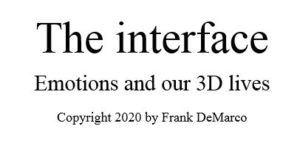
You are regretting the loss of the ideas and side-trails that had suggested themselves as you wrote all that, yesterday and the day before. But it is not lost, only submerged until you should re-read or remember, and allow your mind to play on it.
Mulling it, we say.
Mulling over something is a non-linear, non-rational approach to material that otherwise must be dealt with in a linear way, in the same way it was received. Images (just as in remote viewing) convey gestalts and suppress opinion and cognitive bias.
So do that here, now, on the record, without feeling constrained to defend whatever ideas or associations or questions arise. This will demonstrate a process that will prove useful to many, on many occasions. Only, don’t let your mind wander at random. This is not the time to wonder about the political landscape. You want to let your mind roam within this one given pasture. It may be a difficult trick to master, or it may come easily, but it is valuable. Confining your thought to one subject, let it wool-gather within that subject.
Agreements with others prior to this life. What about the continuity between (among) lives? What about our role after this life, when we are someone else’s TGU, or someone’s strand, or however it works? Besides, looking at it from the point of view of the larger beings rather than our points of view as 3D creatures, how does it look? Do our larger beings wind up laying the same game, on the principle of “As above, so below”?
Try to mull, not reason.
Okay. Well, the whole idea of agreements made prior to 3D seems to put 3D front and center. Should it be? But if 3D isn’t the center, what is? Our personal development? But we are fragments. Why would a process center on the development of fragments into something?
OT1H I can imagine the shared subjectivity as the point. Oh, it feels like something went “Click!” Is that what you wanted me to come to?
It is a potential continuation-place, let’s put it that way. You sensed a thought that inherently connects. But make note of it and continue.
Okay. Well, it could explain why 3D affairs are important to the larger world, if shared subjectivity develops. Bob Monroe had a sense of units reassembling and, when they once reached completion, disappearing from sight as they went on to whatever comes next.
Sticking to Dirk’s question about agreements.
It’s hard to know how to think about it. It implies – funny I never thought of this before – that we are each fabricated to fit a role in a given 3D life’s drama. But if that is so, what were we before we were fabricated? Were we a bunch of not-necessarily-connected parts that could be assembled, like Legos? Or, if we were already units from prior experience, were we –
Oh. Is that the sense of it? Strands being combined to form a new unit?
Make sense to you, suddenly, in a different way?
Yes, I think it does.
That’s the value of context, and that’s a way to invite a different context, by mulling, “wool-gathering,” preferably while making a record for yourself to look over, so you don’t need to hold things in memory. Now restate what came to you.